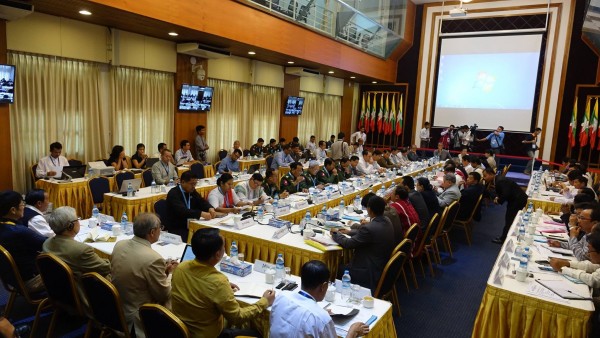The Burmese government has been urged to find a peaceful solution to the ongoing crisis in the Kokang Special Region during the current peace talks being held in Rangoon.
The Nationwide Ceasefire Coordination Team (NCCT), formed of representatives of ethnic armed groups, advocated that both sides should pursue a peaceful and political end to the conflict which has plagued the region since February. The NCCT and the government’s Union Peace-making Work Committee (UPWC)’s latest round of ceasefire negotiations at the Myanmar Peace Centre in Rangoon entered its third day on Thursday, 19 March.
Col. Hkun Okkar, an NCCT leader, told reporters on Thursday: “It is the duty of us all to implement the nationwide ceasefire, including the Kokang. Our policy is to resolve a political problem through political means, but with absolutely no use of military methods.
“The Kokang must also adhere to this policy. Likewise, we request that the government and Tatmadaw [Burmese army] also reduce the conflict as much as they can. We formally presented this request yesterday,” he said.
The government had previously rejected an NCCT proposal to include discussion on the Kokang conflict as an item on the agenda of the talks. Naypyidaw officials insisted that the matter should be discussed in political dialogue after the signing of a Nationwide Ceasefire Agreement.
[related]
Conflict in the Kokang region – along the China-Burma border – has been raging between government troops and ethnic militias, led by the Myanmar Nationalities Democratic Alliance Army, since it broke out on 9 February, causing mass displacement of civilians.
“There are currently 16 armed groups taking part in the ceasefire talks, and the government is prioritising the signing of the Nationwide Ceasefire Agreement with these groups. We provisionally agreed to include other groups, who have the appropriate criteria, in the political dialogue planned afterward,” Hla Maung Shwe, a senior advisor of the Myanmar Peace Centre, told reporters at the meeting.
The seventh round of nationwide ceasefire talks between the UPWC and NCCT kicked off on Tuesday at the Myanmar Peace Centre where eight outstanding points of contention were discussed – issues that have proved obstructive during the drafting of the Nationwide Ceasefire Agreement.
Accord was reached on a linguistic point on Thursday, with a decision reached to use the term “revolution” in the agreement text when describing ethnic armies’ struggle.
Saw Mra Raza Lin, an NCCT member, told DVB that the government agreed on Thursday to the use of certain terminology that it had previously rejected.
“Previously, they did not agree to the use of words such as ‘revolution’, as suggested by the ethnic armed groups, but a compromise has now been reached … I would like to say the talks are going quite well at this time,” said Saw Mra Raza Lin.
The representatives said that on Friday will continue their discussions on what has been widely termed the “road map” of the process.
Remaining outstanding points are reported to include: an agreement on a military code of ethics; troop deployment; the use of recruitment drives; and the establishment of a ceasefire monitoring body. These topics are also due to be discussed during this round of dialogue, expected to last five or six days in total.
On Tuesday, the first day of the talks, delegates reported that agreement was reached on the issue of “conflict reduction”.



